Nursing and Inter-professional Teamwork: Evidence-Based Practice
VerifiedAdded on 2023/06/15
|8
|1894
|137
Report
AI Summary
This report addresses the critical issue of the lack of evidence-based practice within inter-professional healthcare teams and its impact on organizations, patients, and the nursing profession. It highlights how this deficiency leads to poor patient outcomes, increased healthcare costs, and potential medical complications. The report proposes evidence-based interventions, such as cultivating a spirit of inquiry and critically appraising available evidence, while also considering patient values and clinical expertise. It identifies potential barriers to change from the organization, patients, and colleagues, including lack of training, financial support, and interpersonal conflicts. Strategies to overcome these barriers, such as task distribution, training programs, and conflict resolution, are discussed. Finally, the report outlines a plan to implement evidence-based interventions through team formation, pilot projects, and continuous monitoring to foster a culture of evidence-based practice within the organization; solved assignments available on Desklib.

Running head: NURSING
Collaborative nursing
Name of student:
Name of university:
Author note:
Collaborative nursing
Name of student:
Name of university:
Author note:
Paraphrase This Document
Need a fresh take? Get an instant paraphrase of this document with our AI Paraphraser
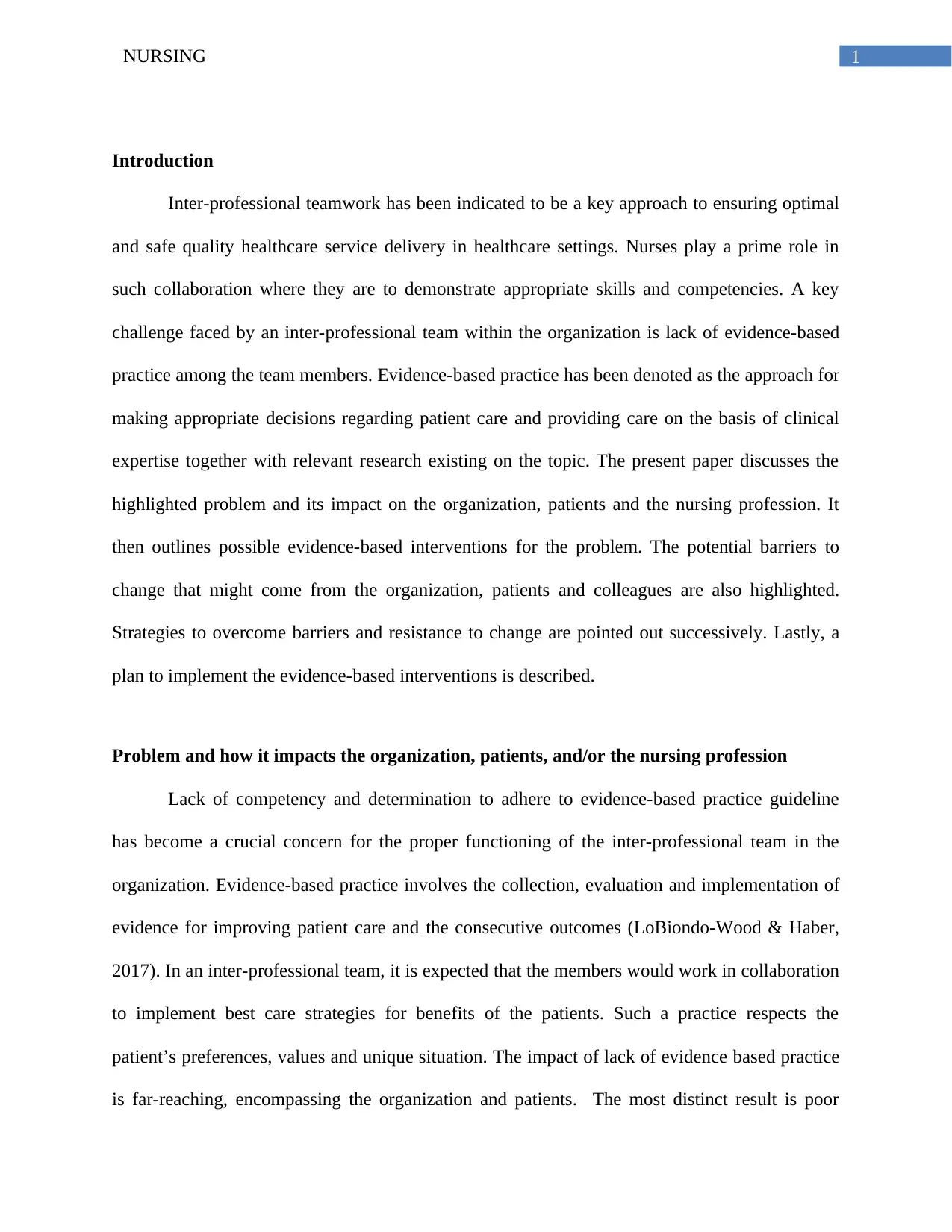
1NURSING
Introduction
Inter-professional teamwork has been indicated to be a key approach to ensuring optimal
and safe quality healthcare service delivery in healthcare settings. Nurses play a prime role in
such collaboration where they are to demonstrate appropriate skills and competencies. A key
challenge faced by an inter-professional team within the organization is lack of evidence-based
practice among the team members. Evidence-based practice has been denoted as the approach for
making appropriate decisions regarding patient care and providing care on the basis of clinical
expertise together with relevant research existing on the topic. The present paper discusses the
highlighted problem and its impact on the organization, patients and the nursing profession. It
then outlines possible evidence-based interventions for the problem. The potential barriers to
change that might come from the organization, patients and colleagues are also highlighted.
Strategies to overcome barriers and resistance to change are pointed out successively. Lastly, a
plan to implement the evidence-based interventions is described.
Problem and how it impacts the organization, patients, and/or the nursing profession
Lack of competency and determination to adhere to evidence-based practice guideline
has become a crucial concern for the proper functioning of the inter-professional team in the
organization. Evidence-based practice involves the collection, evaluation and implementation of
evidence for improving patient care and the consecutive outcomes (LoBiondo-Wood & Haber,
2017). In an inter-professional team, it is expected that the members would work in collaboration
to implement best care strategies for benefits of the patients. Such a practice respects the
patient’s preferences, values and unique situation. The impact of lack of evidence based practice
is far-reaching, encompassing the organization and patients. The most distinct result is poor
Introduction
Inter-professional teamwork has been indicated to be a key approach to ensuring optimal
and safe quality healthcare service delivery in healthcare settings. Nurses play a prime role in
such collaboration where they are to demonstrate appropriate skills and competencies. A key
challenge faced by an inter-professional team within the organization is lack of evidence-based
practice among the team members. Evidence-based practice has been denoted as the approach for
making appropriate decisions regarding patient care and providing care on the basis of clinical
expertise together with relevant research existing on the topic. The present paper discusses the
highlighted problem and its impact on the organization, patients and the nursing profession. It
then outlines possible evidence-based interventions for the problem. The potential barriers to
change that might come from the organization, patients and colleagues are also highlighted.
Strategies to overcome barriers and resistance to change are pointed out successively. Lastly, a
plan to implement the evidence-based interventions is described.
Problem and how it impacts the organization, patients, and/or the nursing profession
Lack of competency and determination to adhere to evidence-based practice guideline
has become a crucial concern for the proper functioning of the inter-professional team in the
organization. Evidence-based practice involves the collection, evaluation and implementation of
evidence for improving patient care and the consecutive outcomes (LoBiondo-Wood & Haber,
2017). In an inter-professional team, it is expected that the members would work in collaboration
to implement best care strategies for benefits of the patients. Such a practice respects the
patient’s preferences, values and unique situation. The impact of lack of evidence based practice
is far-reaching, encompassing the organization and patients. The most distinct result is poor
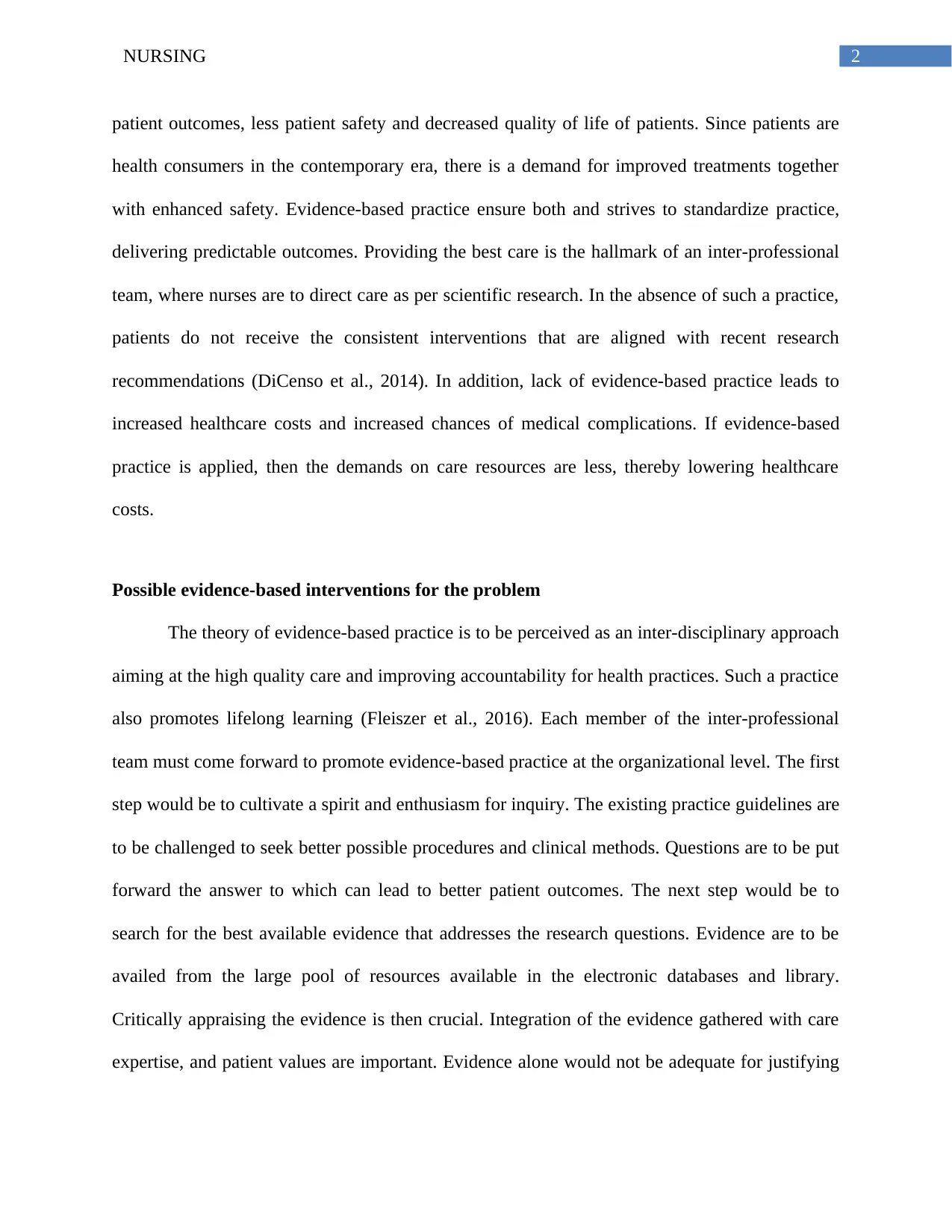
2NURSING
patient outcomes, less patient safety and decreased quality of life of patients. Since patients are
health consumers in the contemporary era, there is a demand for improved treatments together
with enhanced safety. Evidence-based practice ensure both and strives to standardize practice,
delivering predictable outcomes. Providing the best care is the hallmark of an inter-professional
team, where nurses are to direct care as per scientific research. In the absence of such a practice,
patients do not receive the consistent interventions that are aligned with recent research
recommendations (DiCenso et al., 2014). In addition, lack of evidence-based practice leads to
increased healthcare costs and increased chances of medical complications. If evidence-based
practice is applied, then the demands on care resources are less, thereby lowering healthcare
costs.
Possible evidence-based interventions for the problem
The theory of evidence-based practice is to be perceived as an inter-disciplinary approach
aiming at the high quality care and improving accountability for health practices. Such a practice
also promotes lifelong learning (Fleiszer et al., 2016). Each member of the inter-professional
team must come forward to promote evidence-based practice at the organizational level. The first
step would be to cultivate a spirit and enthusiasm for inquiry. The existing practice guidelines are
to be challenged to seek better possible procedures and clinical methods. Questions are to be put
forward the answer to which can lead to better patient outcomes. The next step would be to
search for the best available evidence that addresses the research questions. Evidence are to be
availed from the large pool of resources available in the electronic databases and library.
Critically appraising the evidence is then crucial. Integration of the evidence gathered with care
expertise, and patient values are important. Evidence alone would not be adequate for justifying
patient outcomes, less patient safety and decreased quality of life of patients. Since patients are
health consumers in the contemporary era, there is a demand for improved treatments together
with enhanced safety. Evidence-based practice ensure both and strives to standardize practice,
delivering predictable outcomes. Providing the best care is the hallmark of an inter-professional
team, where nurses are to direct care as per scientific research. In the absence of such a practice,
patients do not receive the consistent interventions that are aligned with recent research
recommendations (DiCenso et al., 2014). In addition, lack of evidence-based practice leads to
increased healthcare costs and increased chances of medical complications. If evidence-based
practice is applied, then the demands on care resources are less, thereby lowering healthcare
costs.
Possible evidence-based interventions for the problem
The theory of evidence-based practice is to be perceived as an inter-disciplinary approach
aiming at the high quality care and improving accountability for health practices. Such a practice
also promotes lifelong learning (Fleiszer et al., 2016). Each member of the inter-professional
team must come forward to promote evidence-based practice at the organizational level. The first
step would be to cultivate a spirit and enthusiasm for inquiry. The existing practice guidelines are
to be challenged to seek better possible procedures and clinical methods. Questions are to be put
forward the answer to which can lead to better patient outcomes. The next step would be to
search for the best available evidence that addresses the research questions. Evidence are to be
availed from the large pool of resources available in the electronic databases and library.
Critically appraising the evidence is then crucial. Integration of the evidence gathered with care
expertise, and patient values are important. Evidence alone would not be adequate for justifying
⊘ This is a preview!⊘
Do you want full access?
Subscribe today to unlock all pages.

Trusted by 1+ million students worldwide
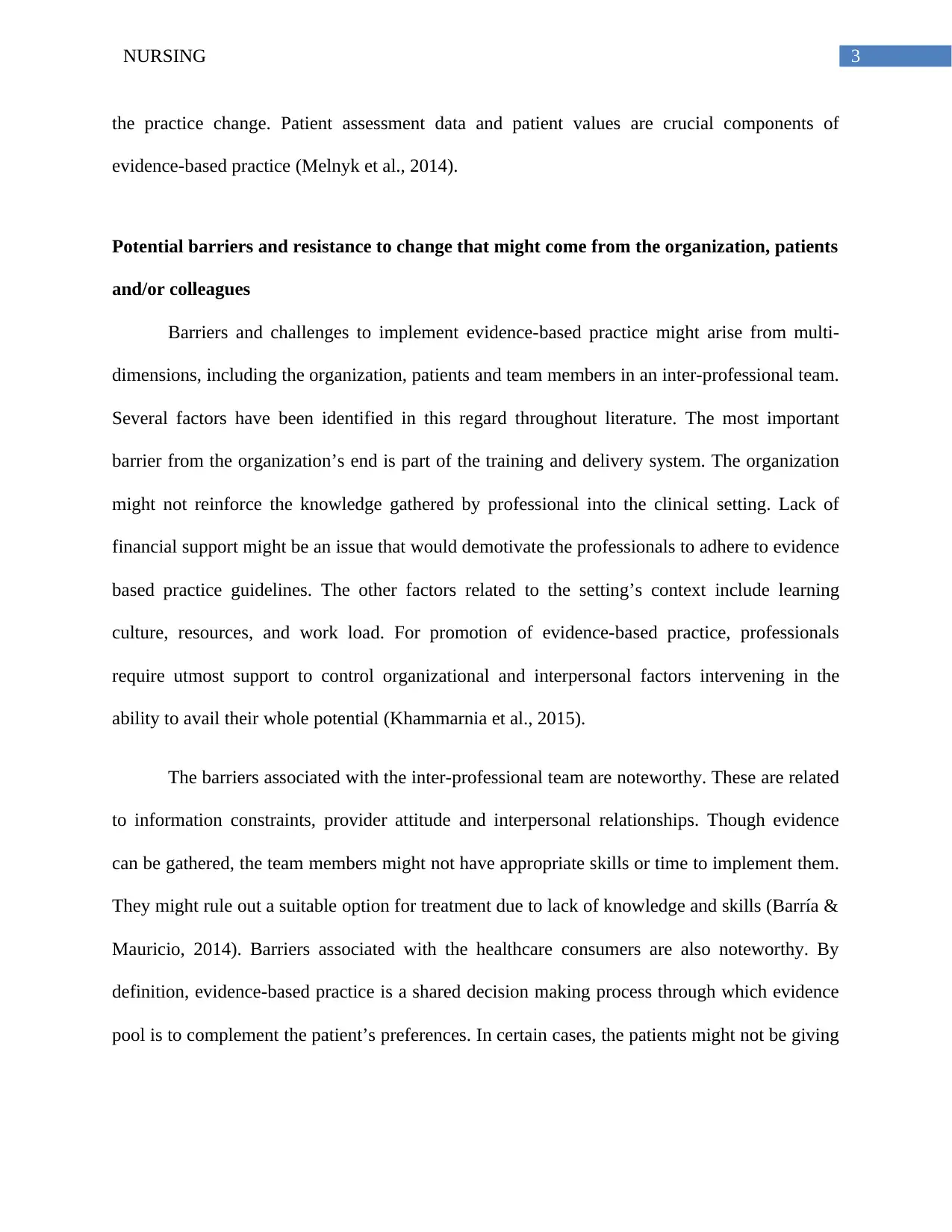
3NURSING
the practice change. Patient assessment data and patient values are crucial components of
evidence-based practice (Melnyk et al., 2014).
Potential barriers and resistance to change that might come from the organization, patients
and/or colleagues
Barriers and challenges to implement evidence-based practice might arise from multi-
dimensions, including the organization, patients and team members in an inter-professional team.
Several factors have been identified in this regard throughout literature. The most important
barrier from the organization’s end is part of the training and delivery system. The organization
might not reinforce the knowledge gathered by professional into the clinical setting. Lack of
financial support might be an issue that would demotivate the professionals to adhere to evidence
based practice guidelines. The other factors related to the setting’s context include learning
culture, resources, and work load. For promotion of evidence-based practice, professionals
require utmost support to control organizational and interpersonal factors intervening in the
ability to avail their whole potential (Khammarnia et al., 2015).
The barriers associated with the inter-professional team are noteworthy. These are related
to information constraints, provider attitude and interpersonal relationships. Though evidence
can be gathered, the team members might not have appropriate skills or time to implement them.
They might rule out a suitable option for treatment due to lack of knowledge and skills (Barría &
Mauricio, 2014). Barriers associated with the healthcare consumers are also noteworthy. By
definition, evidence-based practice is a shared decision making process through which evidence
pool is to complement the patient’s preferences. In certain cases, the patients might not be giving
the practice change. Patient assessment data and patient values are crucial components of
evidence-based practice (Melnyk et al., 2014).
Potential barriers and resistance to change that might come from the organization, patients
and/or colleagues
Barriers and challenges to implement evidence-based practice might arise from multi-
dimensions, including the organization, patients and team members in an inter-professional team.
Several factors have been identified in this regard throughout literature. The most important
barrier from the organization’s end is part of the training and delivery system. The organization
might not reinforce the knowledge gathered by professional into the clinical setting. Lack of
financial support might be an issue that would demotivate the professionals to adhere to evidence
based practice guidelines. The other factors related to the setting’s context include learning
culture, resources, and work load. For promotion of evidence-based practice, professionals
require utmost support to control organizational and interpersonal factors intervening in the
ability to avail their whole potential (Khammarnia et al., 2015).
The barriers associated with the inter-professional team are noteworthy. These are related
to information constraints, provider attitude and interpersonal relationships. Though evidence
can be gathered, the team members might not have appropriate skills or time to implement them.
They might rule out a suitable option for treatment due to lack of knowledge and skills (Barría &
Mauricio, 2014). Barriers associated with the healthcare consumers are also noteworthy. By
definition, evidence-based practice is a shared decision making process through which evidence
pool is to complement the patient’s preferences. In certain cases, the patients might not be giving
Paraphrase This Document
Need a fresh take? Get an instant paraphrase of this document with our AI Paraphraser
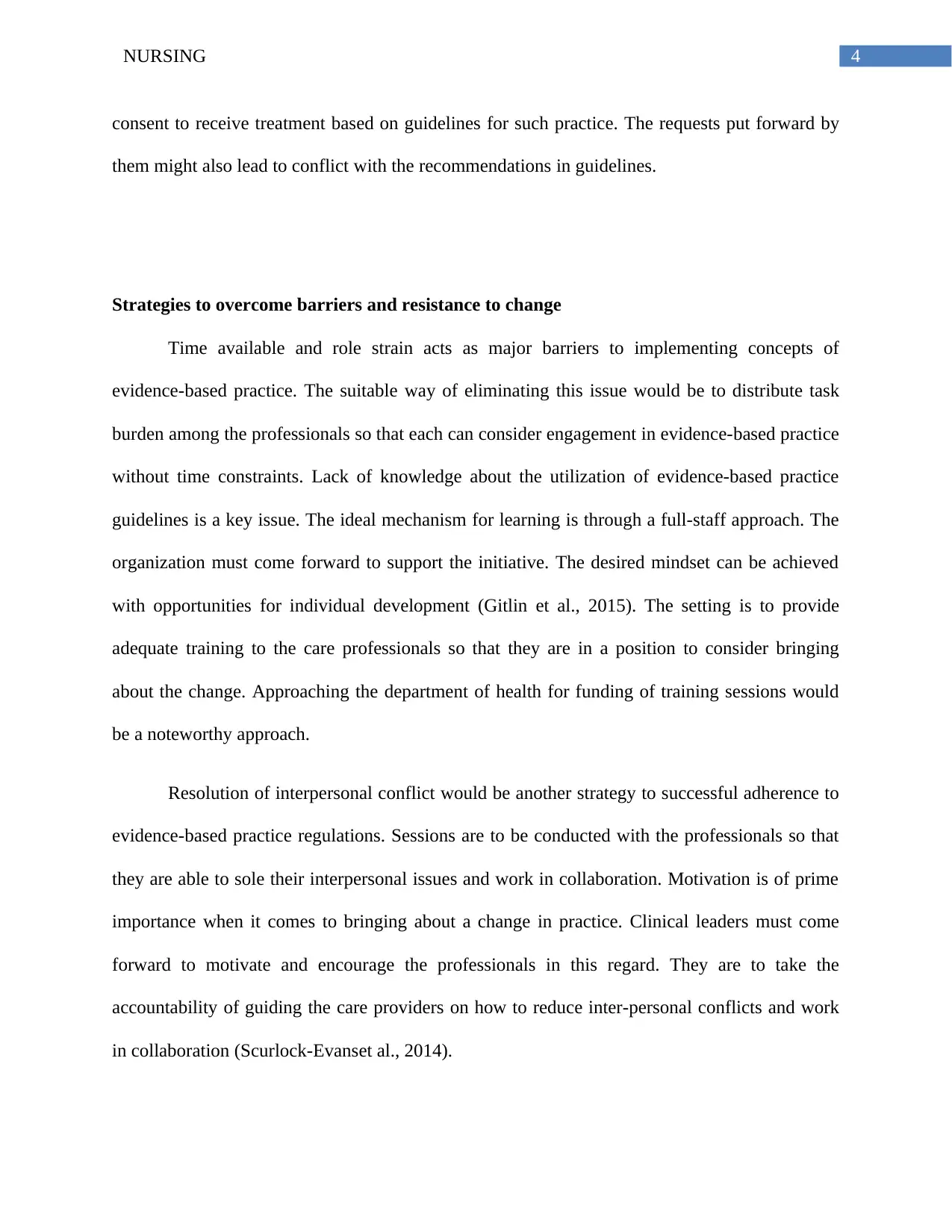
4NURSING
consent to receive treatment based on guidelines for such practice. The requests put forward by
them might also lead to conflict with the recommendations in guidelines.
Strategies to overcome barriers and resistance to change
Time available and role strain acts as major barriers to implementing concepts of
evidence-based practice. The suitable way of eliminating this issue would be to distribute task
burden among the professionals so that each can consider engagement in evidence-based practice
without time constraints. Lack of knowledge about the utilization of evidence-based practice
guidelines is a key issue. The ideal mechanism for learning is through a full-staff approach. The
organization must come forward to support the initiative. The desired mindset can be achieved
with opportunities for individual development (Gitlin et al., 2015). The setting is to provide
adequate training to the care professionals so that they are in a position to consider bringing
about the change. Approaching the department of health for funding of training sessions would
be a noteworthy approach.
Resolution of interpersonal conflict would be another strategy to successful adherence to
evidence-based practice regulations. Sessions are to be conducted with the professionals so that
they are able to sole their interpersonal issues and work in collaboration. Motivation is of prime
importance when it comes to bringing about a change in practice. Clinical leaders must come
forward to motivate and encourage the professionals in this regard. They are to take the
accountability of guiding the care providers on how to reduce inter-personal conflicts and work
in collaboration (Scurlock-Evanset al., 2014).
consent to receive treatment based on guidelines for such practice. The requests put forward by
them might also lead to conflict with the recommendations in guidelines.
Strategies to overcome barriers and resistance to change
Time available and role strain acts as major barriers to implementing concepts of
evidence-based practice. The suitable way of eliminating this issue would be to distribute task
burden among the professionals so that each can consider engagement in evidence-based practice
without time constraints. Lack of knowledge about the utilization of evidence-based practice
guidelines is a key issue. The ideal mechanism for learning is through a full-staff approach. The
organization must come forward to support the initiative. The desired mindset can be achieved
with opportunities for individual development (Gitlin et al., 2015). The setting is to provide
adequate training to the care professionals so that they are in a position to consider bringing
about the change. Approaching the department of health for funding of training sessions would
be a noteworthy approach.
Resolution of interpersonal conflict would be another strategy to successful adherence to
evidence-based practice regulations. Sessions are to be conducted with the professionals so that
they are able to sole their interpersonal issues and work in collaboration. Motivation is of prime
importance when it comes to bringing about a change in practice. Clinical leaders must come
forward to motivate and encourage the professionals in this regard. They are to take the
accountability of guiding the care providers on how to reduce inter-personal conflicts and work
in collaboration (Scurlock-Evanset al., 2014).
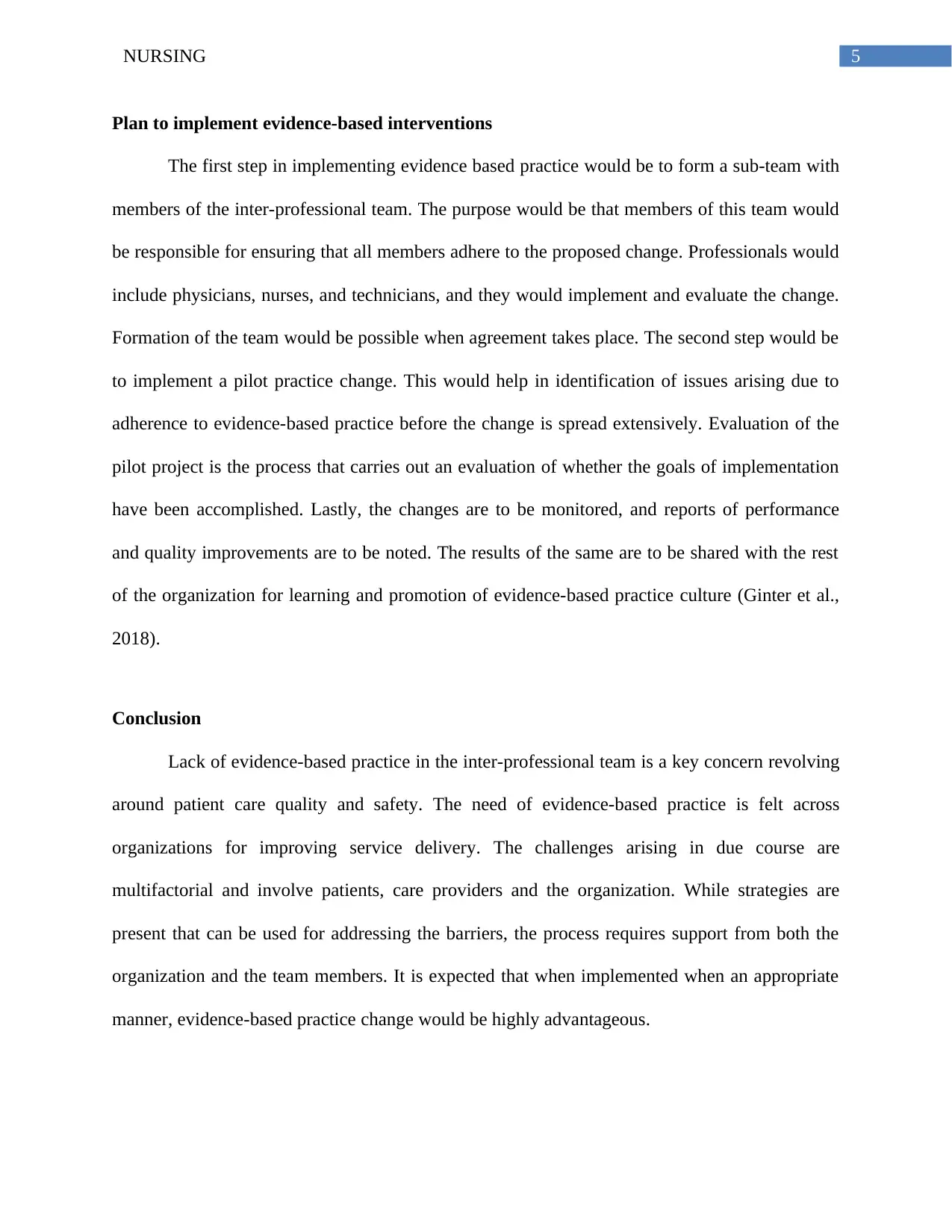
5NURSING
Plan to implement evidence-based interventions
The first step in implementing evidence based practice would be to form a sub-team with
members of the inter-professional team. The purpose would be that members of this team would
be responsible for ensuring that all members adhere to the proposed change. Professionals would
include physicians, nurses, and technicians, and they would implement and evaluate the change.
Formation of the team would be possible when agreement takes place. The second step would be
to implement a pilot practice change. This would help in identification of issues arising due to
adherence to evidence-based practice before the change is spread extensively. Evaluation of the
pilot project is the process that carries out an evaluation of whether the goals of implementation
have been accomplished. Lastly, the changes are to be monitored, and reports of performance
and quality improvements are to be noted. The results of the same are to be shared with the rest
of the organization for learning and promotion of evidence-based practice culture (Ginter et al.,
2018).
Conclusion
Lack of evidence-based practice in the inter-professional team is a key concern revolving
around patient care quality and safety. The need of evidence-based practice is felt across
organizations for improving service delivery. The challenges arising in due course are
multifactorial and involve patients, care providers and the organization. While strategies are
present that can be used for addressing the barriers, the process requires support from both the
organization and the team members. It is expected that when implemented when an appropriate
manner, evidence-based practice change would be highly advantageous.
Plan to implement evidence-based interventions
The first step in implementing evidence based practice would be to form a sub-team with
members of the inter-professional team. The purpose would be that members of this team would
be responsible for ensuring that all members adhere to the proposed change. Professionals would
include physicians, nurses, and technicians, and they would implement and evaluate the change.
Formation of the team would be possible when agreement takes place. The second step would be
to implement a pilot practice change. This would help in identification of issues arising due to
adherence to evidence-based practice before the change is spread extensively. Evaluation of the
pilot project is the process that carries out an evaluation of whether the goals of implementation
have been accomplished. Lastly, the changes are to be monitored, and reports of performance
and quality improvements are to be noted. The results of the same are to be shared with the rest
of the organization for learning and promotion of evidence-based practice culture (Ginter et al.,
2018).
Conclusion
Lack of evidence-based practice in the inter-professional team is a key concern revolving
around patient care quality and safety. The need of evidence-based practice is felt across
organizations for improving service delivery. The challenges arising in due course are
multifactorial and involve patients, care providers and the organization. While strategies are
present that can be used for addressing the barriers, the process requires support from both the
organization and the team members. It is expected that when implemented when an appropriate
manner, evidence-based practice change would be highly advantageous.
⊘ This is a preview!⊘
Do you want full access?
Subscribe today to unlock all pages.

Trusted by 1+ million students worldwide
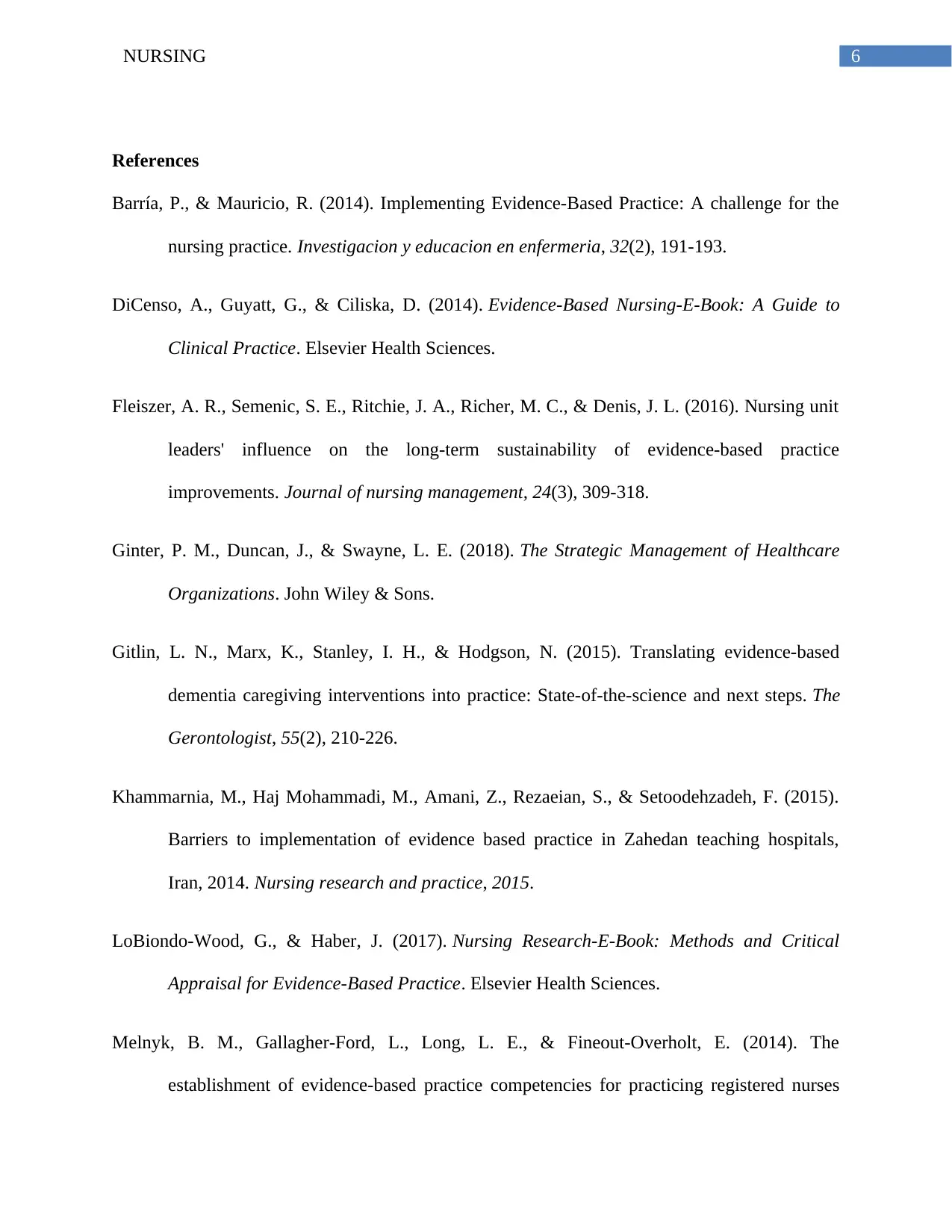
6NURSING
References
Barría, P., & Mauricio, R. (2014). Implementing Evidence-Based Practice: A challenge for the
nursing practice. Investigacion y educacion en enfermeria, 32(2), 191-193.
DiCenso, A., Guyatt, G., & Ciliska, D. (2014). Evidence-Based Nursing-E-Book: A Guide to
Clinical Practice. Elsevier Health Sciences.
Fleiszer, A. R., Semenic, S. E., Ritchie, J. A., Richer, M. C., & Denis, J. L. (2016). Nursing unit
leaders' influence on the long‐term sustainability of evidence‐based practice
improvements. Journal of nursing management, 24(3), 309-318.
Ginter, P. M., Duncan, J., & Swayne, L. E. (2018). The Strategic Management of Healthcare
Organizations. John Wiley & Sons.
Gitlin, L. N., Marx, K., Stanley, I. H., & Hodgson, N. (2015). Translating evidence-based
dementia caregiving interventions into practice: State-of-the-science and next steps. The
Gerontologist, 55(2), 210-226.
Khammarnia, M., Haj Mohammadi, M., Amani, Z., Rezaeian, S., & Setoodehzadeh, F. (2015).
Barriers to implementation of evidence based practice in Zahedan teaching hospitals,
Iran, 2014. Nursing research and practice, 2015.
LoBiondo-Wood, G., & Haber, J. (2017). Nursing Research-E-Book: Methods and Critical
Appraisal for Evidence-Based Practice. Elsevier Health Sciences.
Melnyk, B. M., Gallagher‐Ford, L., Long, L. E., & Fineout‐Overholt, E. (2014). The
establishment of evidence‐based practice competencies for practicing registered nurses
References
Barría, P., & Mauricio, R. (2014). Implementing Evidence-Based Practice: A challenge for the
nursing practice. Investigacion y educacion en enfermeria, 32(2), 191-193.
DiCenso, A., Guyatt, G., & Ciliska, D. (2014). Evidence-Based Nursing-E-Book: A Guide to
Clinical Practice. Elsevier Health Sciences.
Fleiszer, A. R., Semenic, S. E., Ritchie, J. A., Richer, M. C., & Denis, J. L. (2016). Nursing unit
leaders' influence on the long‐term sustainability of evidence‐based practice
improvements. Journal of nursing management, 24(3), 309-318.
Ginter, P. M., Duncan, J., & Swayne, L. E. (2018). The Strategic Management of Healthcare
Organizations. John Wiley & Sons.
Gitlin, L. N., Marx, K., Stanley, I. H., & Hodgson, N. (2015). Translating evidence-based
dementia caregiving interventions into practice: State-of-the-science and next steps. The
Gerontologist, 55(2), 210-226.
Khammarnia, M., Haj Mohammadi, M., Amani, Z., Rezaeian, S., & Setoodehzadeh, F. (2015).
Barriers to implementation of evidence based practice in Zahedan teaching hospitals,
Iran, 2014. Nursing research and practice, 2015.
LoBiondo-Wood, G., & Haber, J. (2017). Nursing Research-E-Book: Methods and Critical
Appraisal for Evidence-Based Practice. Elsevier Health Sciences.
Melnyk, B. M., Gallagher‐Ford, L., Long, L. E., & Fineout‐Overholt, E. (2014). The
establishment of evidence‐based practice competencies for practicing registered nurses
Paraphrase This Document
Need a fresh take? Get an instant paraphrase of this document with our AI Paraphraser
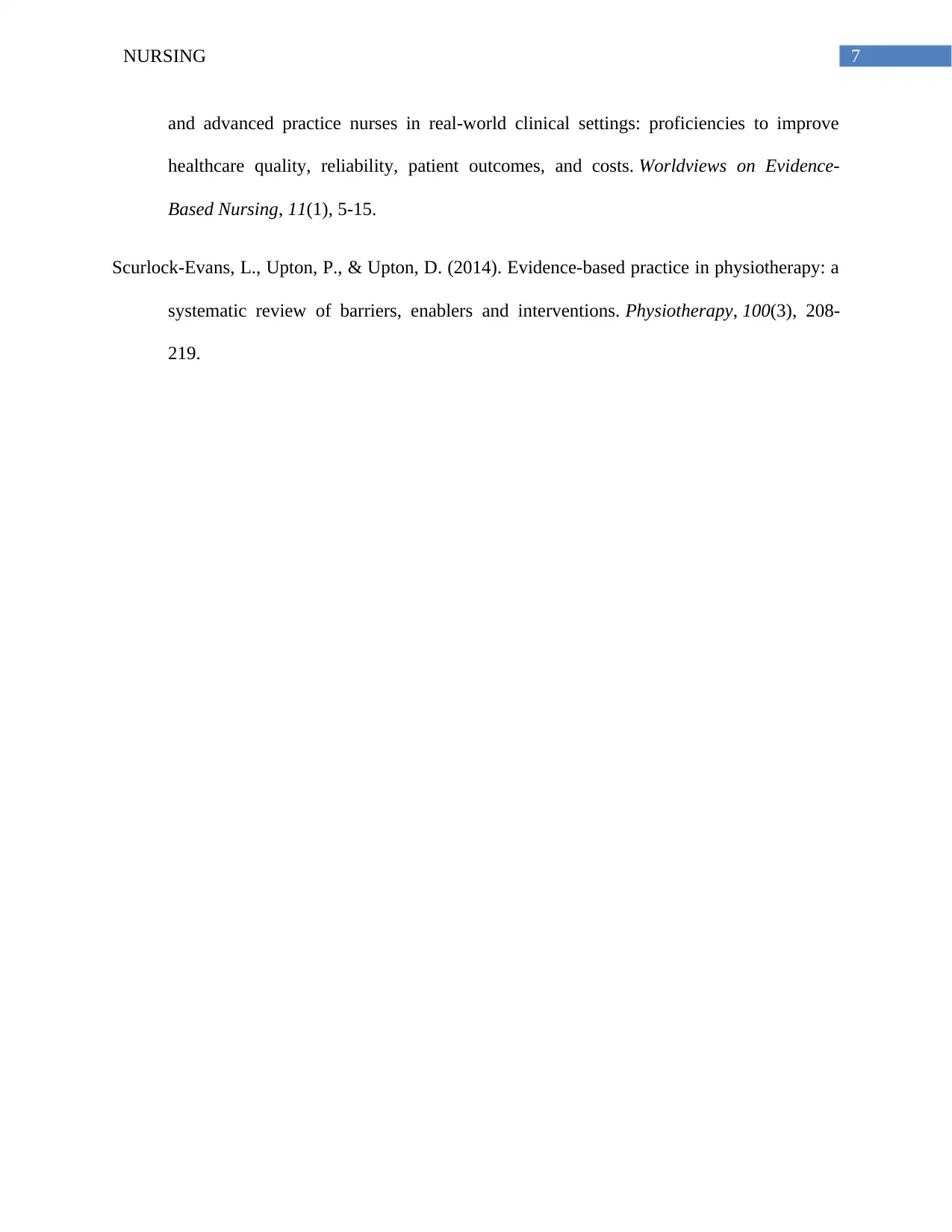
7NURSING
and advanced practice nurses in real‐world clinical settings: proficiencies to improve
healthcare quality, reliability, patient outcomes, and costs. Worldviews on Evidence‐
Based Nursing, 11(1), 5-15.
Scurlock-Evans, L., Upton, P., & Upton, D. (2014). Evidence-based practice in physiotherapy: a
systematic review of barriers, enablers and interventions. Physiotherapy, 100(3), 208-
219.
and advanced practice nurses in real‐world clinical settings: proficiencies to improve
healthcare quality, reliability, patient outcomes, and costs. Worldviews on Evidence‐
Based Nursing, 11(1), 5-15.
Scurlock-Evans, L., Upton, P., & Upton, D. (2014). Evidence-based practice in physiotherapy: a
systematic review of barriers, enablers and interventions. Physiotherapy, 100(3), 208-
219.
1 out of 8
Related Documents
Your All-in-One AI-Powered Toolkit for Academic Success.
+13062052269
info@desklib.com
Available 24*7 on WhatsApp / Email
![[object Object]](/_next/static/media/star-bottom.7253800d.svg)
Unlock your academic potential
Copyright © 2020–2026 A2Z Services. All Rights Reserved. Developed and managed by ZUCOL.





